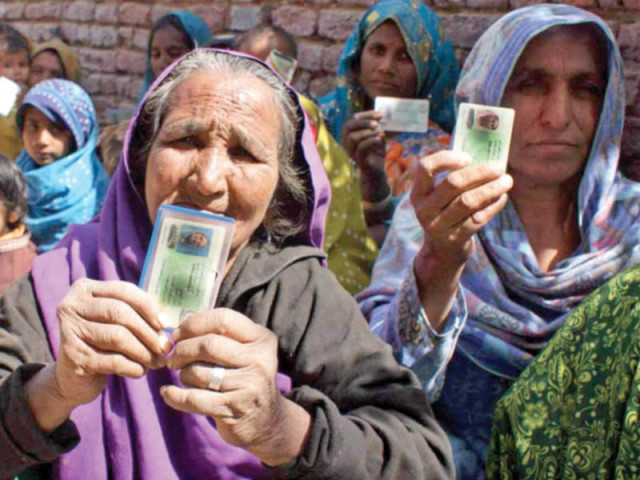General elections: Women quota law fails to yield results
Women representation on general seats in National Assembly drops to a historic low

Representational image. PHOTO: INP
The Elections Act of 2017 made it mandatory for all political parties to set aside at least five per cent of tickets to women on general seats.
Women participation in the July 25 general election witnessed a slight improvement. A total of 183 women contested polls on 272 general seats of the National Assembly. Of the total, only eight were successful in entering the National Assembly. This number is the lowest since 2002.
Low women turnout: ECP holds notification for PK-23
There were no representation of women in the National Assembly that later adopted the 1973 Constitution.
As many as 10 reserved seats for women were first introduced in the 1977 election via a sunset clause in the Constitution. This clause called for abolishing the reserved seats after “10 years or three electoral cycles”.
During the 1977 election for 216-member National Assembly, only one woman contested on a general seat and won. Ten more women were inducted into the National Assembly after the introduction of reserved seats, constituting 5.1 per cent of the house’s strength.
Reserved seats for women in the National Assembly were increased to 20 in the 1985 non-party based elections during the regime of General Ziaul Haq. During the election in 1985, fifteen more women contested on general seats, but just one won, bringing the total strength of women to 21 or 8.9 per cent of the 237-member house.
In the 1988 general election, 16 women contested on general seats. Three, including Benazir Bhutto, won various constituencies. Benazir Bhutto was later elected as the country’s first woman Prime Minister.
Cumulative strength of women in the 237-member National Assembly was 23, accounting for 9.7 per cent of the house strength.
After the expiry of the sunset clause after three electoral cycles – 1979, 1985 and 1988 – the quota of reserved seats for women stood abolished.
In 1990 general election, 12 women contested election to the National Assembly on the general seats. Only two of them were declared successful, effectively reducing women’s representation in the lower house to just 0.9 per cent of the 217-member house.
During the 1993 general election, 14 women contested on general seats. Only four of them were victorious, making up just 1.8 per cent of the total house strength.
In the 1997 general election, as many as 35 women contested polls on general seats and five of them won.
After the 1999 military coup, General (retd) Pervez Musharraf reintroduced 60 reserved seats for women in the National Assembly by amending the Constitution through a Legal Framework Order (LFO).
In a historic first, women cast votes in remote Punjab village
During the 2002 general election, as many as 57 women contested on general seats and 13 of them secured wins.
With 60 reserved seats, the National Assembly had 73 women members or 21.6 per cent of the now 342-member lower of house of parliament.
In 2008 general election, 64 women contested on general seats and a record 16 of them were declared successful.
After the 2018 polls, 76 women were part of the National Assembly, forming 22.2 per cent of the total membership of the house.
During the 2013 general election, 161 women contested polls on general seats, but only nine won. This reduced the strength of women to 70 or 20.5 per cent in the National Assembly.
During the July 25 general election, a total of 183 women contested on the directly-elected seats, but only eight managed to win.
With 60 reserved seats, their collective representation in the National Assembly is now 68. The PPP leads with three women lawmakers who secured general seats, followed by PTI’s two, and one each of the PML-N, the GDA and the BAP.



















COMMENTS
Comments are moderated and generally will be posted if they are on-topic and not abusive.
For more information, please see our Comments FAQ